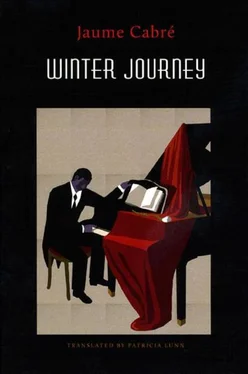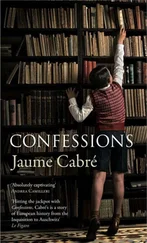He was the delicate one, but it was Anna who died unexpectedly. She was the one who was energetic, never got sick, went to great lengths to avoid conflict. And one day her head hurt, Zoltan, it hurts so much 1 can hardly see, and in the hospital everyone was very reassuring without ever looking them in the eye and, without more ado, they admitted her. She never left, poor Anna, l cried for her only when she died. A quick death, as if she didn't want to bother those who would stay behind in sorrow, a discreet exit from a woman who had loved him and respected his mysterious unhappiness without insisting on complicated or perhaps impossible explanations.
And after she died, Zoltan never went back to her grave. He went on looking at the Danube from his balcony, his pipe in his hands and his memory of Margit tinged with a profound feeling of guilt because in fifteen years of marriage he'd never laughed or made the slightest effort to laugh, and maybe the lack of laughter at home had helped to form the clot in Anna's brain. Anna, who for so many years had acted as if life were good, everything's fine, one day Zoltan will get over whatever it is and everything will be different, we'll walk along the Prater, we'll go to Heiligenstadt to look at the pretty houses and pretend they're ours, and we'll have chocolate ice cream in Graben, like everybody else.
After Anna's death, which happened at about the same time as Professor Bauer's retirement, Zoltan Wesselenyi threw himself desperately into research in order to forget Margit completely, and especially to forget that irritating far-off appointment, which kept his wounds from healing. Also, he was sick of sight reading for second-rate singers worried about their sore throats, who neither looked at him nor thanked him, because the rehearsal pianist is just part of the piano, who always has to be ready, with no sorrows or secret hopes of his own, no need to go and take a piss. He was sick of repeating the same piece ten thousand times, sick of the dirty green of the walls of the rehearsal room where he toiled six hours every day except for Saturdays and Sundays when there was a performance. He was sick of thinking that music was an activity as sad as he was, and he left the little theater without looking back, as Margit had done with him. After devoting a few years to research, he managed to wrap the memory in anesthetic gauze, and he had the two lucky breaks that gave him the prestige he now enjoyed in the field of musicology. He made two finds without setting a foot outside the Musikwissenschaftzentrum of the city of Vienna. One torrentially rainy day, going through a pile of official newspapers from the beginning of the century, he found the slightly mildewed but perfectly legible score of an unknown Lied by Schubert, in his own hand, which bore the title Der Mauersegler and was dated 1820. With the score was a note from one Mattias Holbein, a tavern keeper from Grinzing, which certified that he had received the score as payment for a night that the seraphic Schubert had spent carousing in his establishment in the company of an impulsive and unidentified young lady. And that the composition was written in his presence in less than an hour, the day after the revels, when the musician found himself short of funds. The ineffectual city employees had misfiled the paper, surely with the intention of cementing the prestige of an unhappy Hungarian musicologist a century and a half later on a torrentially rainy afternoon. The other, much more recent, find, was more significant, because it resulted in changes to many preconceived notions about musical historiography. Among the papers that the organist Kaspar Fischer had bequeathed to the city of Vienna when he died there, at a great age, in 1828, was a score in his hand of a diabolical Contrapunctum on the unheard-of theme B-flat, A, D-flat, B, C.The development of the seven variations of this theme was canonical, complete, intelligent, full of ideas, lyrically forceful, confident in the manner of the great masters, and it spoke to the listener in a pan-tonal language eighty years before Schonberg began to think of such things. That masterpiece placed Kaspar Fischer, the author of no other known composition, born in Leipzig but for forty years the humble organist of the Franziskaner-Kirche in Vienna, among the enlightened, among the prophets and geniuses that every art must have from time to time, and it rescued him from an oblivion that would have been terribly undeserved. And it gave Zoltan Wessellyeni a bit of professional prestige, which in fact he did not seek. Too bad Anna hadn't lived to see it. Another stroke of luck broke in on his prayers the day he was playing with Fischer's theme, B-flat, A, Dflat, B, C, the BADESHC theme that had no meaning: he'd been making anagrammatic combinations of the notes when he came on the order D-flat, B-flat, A, C, B.He couldn't relate the letters to one another because the ringing of the telephone distracted him from his obsession. A lucky call: Herr Kreutz informing him that he'd come across a copy of the unobtainable first edition of Laforgue's Voyage d'hiver. Naturally, he bought it without haggling over the price, and as he was paging through it, curious to see if it made any reference, however oblique, to the unpublished Lied, he came across a kind of bookmark made of very worn leather of an indefinable yellowish color, embossed with a zoological figure. Who knows how long it had been there. The bookmark was placed exactly at the page containing a sepia-colored photo of Schubert's tomb. Immediately the anesthetic gauze dissolved, and all the memories came tumbling down on him. In the photo was a group of people: Gaston Laforgue in the middle, straight as an arrow, covering half the tomb, looking intently at the lens, as if doing so were the most important job in the world; the editor, Schaaf, holding onto his arm; two other men, to whom no reference was made; and a woman, looking away like an absent lover. He stared at the tomb, and Margit's face filled the eyes of his imagination. Not for six more years, Margit, wherever you are. For a few moments he thought that the dreaming woman wasn't part of Laforgue's group: it was Margit, looking for him in the place where they were to meet, sixty years before they knew one another.
The months melted into one another slowly, insipidly, rather meaninglessly, and the prestigious musicologist received the praise, awards, honors and admiration of his colleagues with intimate indifference. Whenever he could, he avoided trips, ceremonies and speeches. He preferred to sit by the window that told him if it was raining or snowing, if the leaves were falling or if it was sunny, to rescue what others had forgotten, he who was incapable of forgetting, as he waited impatiently for time to pass. Peter visited him more than once in the midst of files and scores, and they would talk about music and discoveries, and Zoltan would ask him what it was like always having to be perfect on stage, and Pere Bros, who didn't want to get into it, would answer vaguely, Well, you know, and neither of them would ask for details because modesty prevented one of them from explaining why he was always nervous and the other why he was so sad. But because Zoltan was older, one day he made up his mind and asked, Peter, are you happy, and when he answered, Yes, sure, Zoltan understood it was a lie. That's why he came out with, if someday music doesn't make you happy… we can talk. If you want. And as he said it he was thinking of Margit's harmonious voice.
Zoltan took off his glove and laid his hand flat on the wet seat of the stone bench. As if he expected to feel still the warmth of Margit from twenty-five years ago. Beethoven had no flowers on his tomb. There was a solitary pot with a proud cyclamen at the foot of Brahms's. Who took care of bringing flowers to other people's graves? And was somebody, nowadays, bringing flowers to Anna's? He moved closer to Schubert's grave with the intention of reading the inscription on the stone. Then he realized he couldn't because his eyes were filmed with tears. Until then he hadn't realized that he'd begun to cry when he saw she wasn't there. "In the snow 1 search in vain for the footprint left behind, when arm-in-arm the two of us would cross the meadow's green," he thought. Had he known it, he would have sung to himself
Читать дальше












